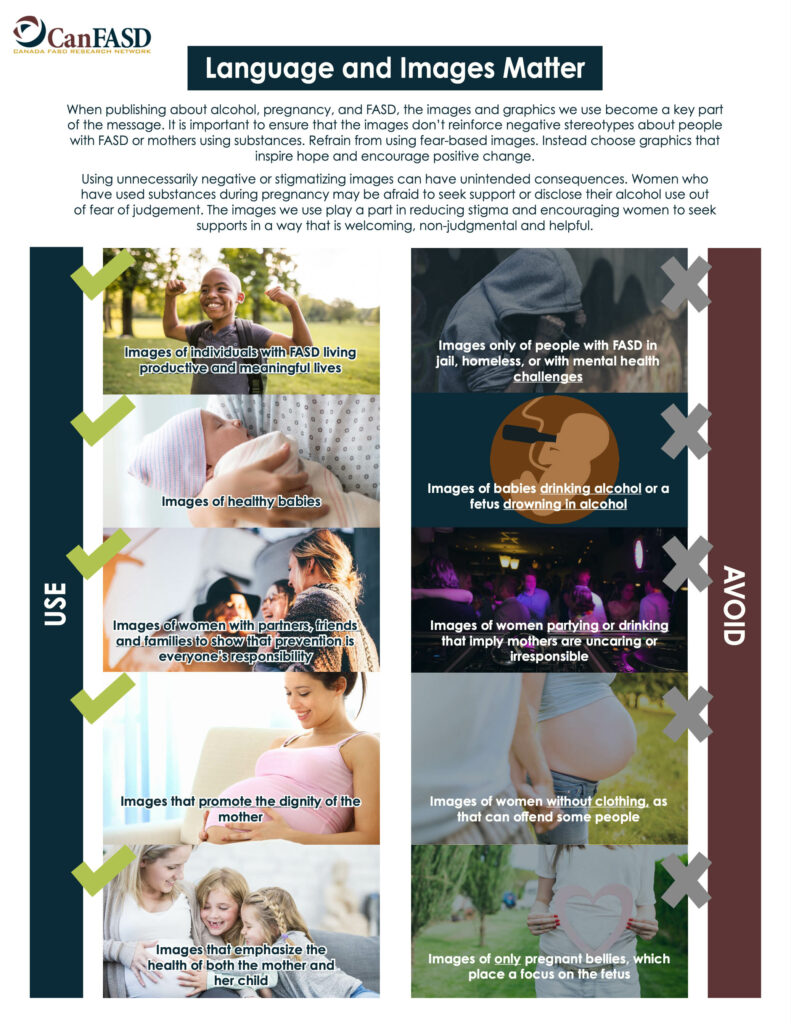Language Matters
How we talk about disabilities like Fetal Alcohol Spectrum Disorder (FASD) is important. FASD is highly stigmatized. People with FASD, their families, and pregnant women and girls experience multiple layers of stigma daily that can negatively impact how they move through the world and access care.
Stigma can impact people’s self esteem. It can make people afraid to seek care or support. It can contribute to feelings of shame, self-doubt, and . Stigma can lead to discrimination against a group of people.
How to talk about FASD
Even with the best intentions, when we use stigmatizing language or focus on negatives, we can unintentionally cause harm. Instead, using clear, positive, and non-stigmatizing language can challenge stereotypes about people with FASD, promote compassion for people who use substances during pregnancy, and help others to see people with FASD as more than a disability.
While we want to share the message about FASD far and wide, we need to pay specific attention the words and images we use. Sentences like “FASD is 100% preventable” oversimplify a complex issue. It’s better to say “FASD can be prevented”. Words like “suffering” and “damaged” focus on the negative. They imply that people with FASD are victims who aren’t capable of living fulfilling lives. It is better to say “people with FASD” or “affected by FASD” to reinforce their full spectrum of experience.
Here are some resources you can use to learn more!
Common Messages: Guidelines for talking and writing about FASD
Updated annually, the purpose of this document is to encourage consistency in how we talk about FASD and the issues related. It outlines key statistics, emerging research, how to frame topics, and best practices related to language use.
Reporting on Alcohol, Alcohol Use in Pregnancy, and FASD
The purpose of this resource is to answer the media’s common questions about alcohol use, alcohol use during pregnancy, and Fetal Alcohol Spectrum Disorder (FASD) to help people who work in the media to report on this disability.
Language Guide
This guide gives alternative words or phrases to talk about FASD in an effort to promote the dignity of those living with FASD and their families.
Seeing the Spectrum: Mapping the Gaps between Expert and Public Understandings of Fetal Alcohol Spectrum Disorder in Manitoba
This report identifies common understandings and assumptions that shape how the public understands FASD and provides recommendations for how to frame future messaging and communications.
Français
Messages Communs: Lignes directrices pour parler et écrire au sujet du TSAF
Le présent document a pour but d’aider les personnes qui écrivent et parlent des personnes atteintes du TSAF ou des problèmes liés au trouble à utiliser les mêmes statistiques, cadrage des sujets et langage. En utilisant ces suggestions de manière constante, le lecteur / auditeur comprendra mieux le domaine du TSAF.
Parler de TSAF
Ce guide a été réalisé pour fournir des mots ou expressions autres que ceux couramment utilisés dans notre société. Nous proposons l’utilisation de ces mots afin de promouvoir la dignité de ceux atteints des Troubles du Spectre de l’Alcoolisation Fœtale (TSAF) et leur famille.
FASD Media Guide
FASD Media Guide [zip archive]
This guide is intended for health care professionals, service providers, journalists, or anyone who might speak to the media about FASD. Use this resource to help guide you on how to speak about FASD, or how to create your own campaign on FASD/alcohol and pregnancy, ensuring that the language you use is informed, inclusive, and non-stigmatizing.

